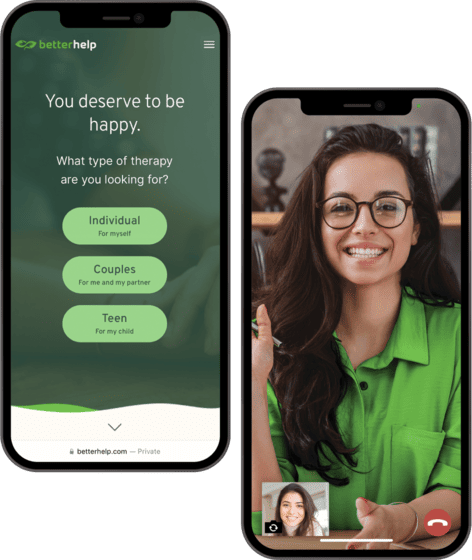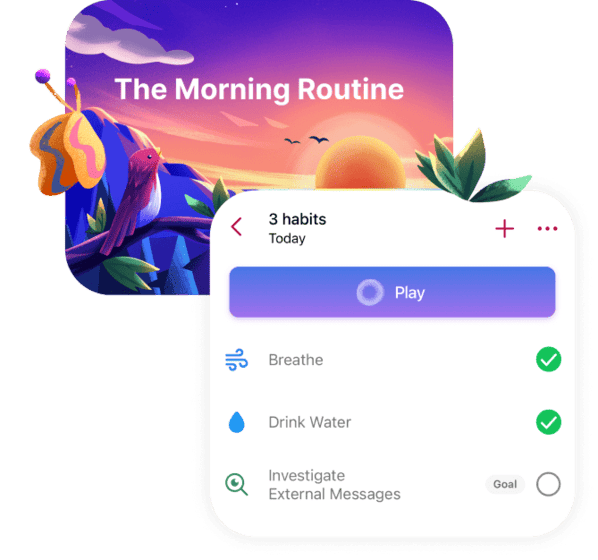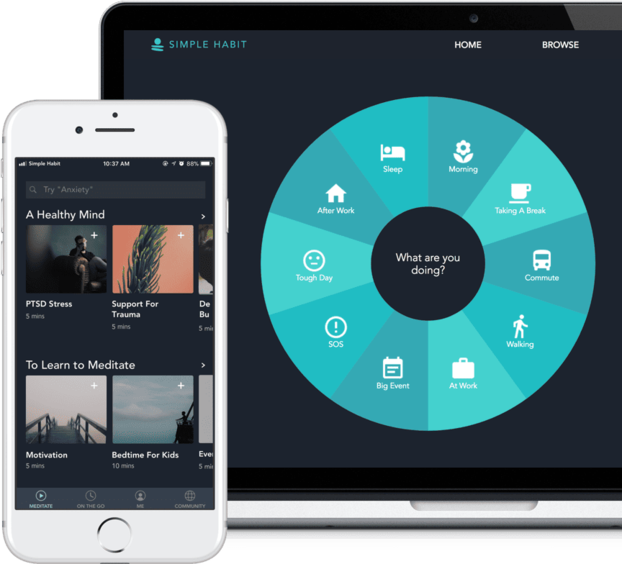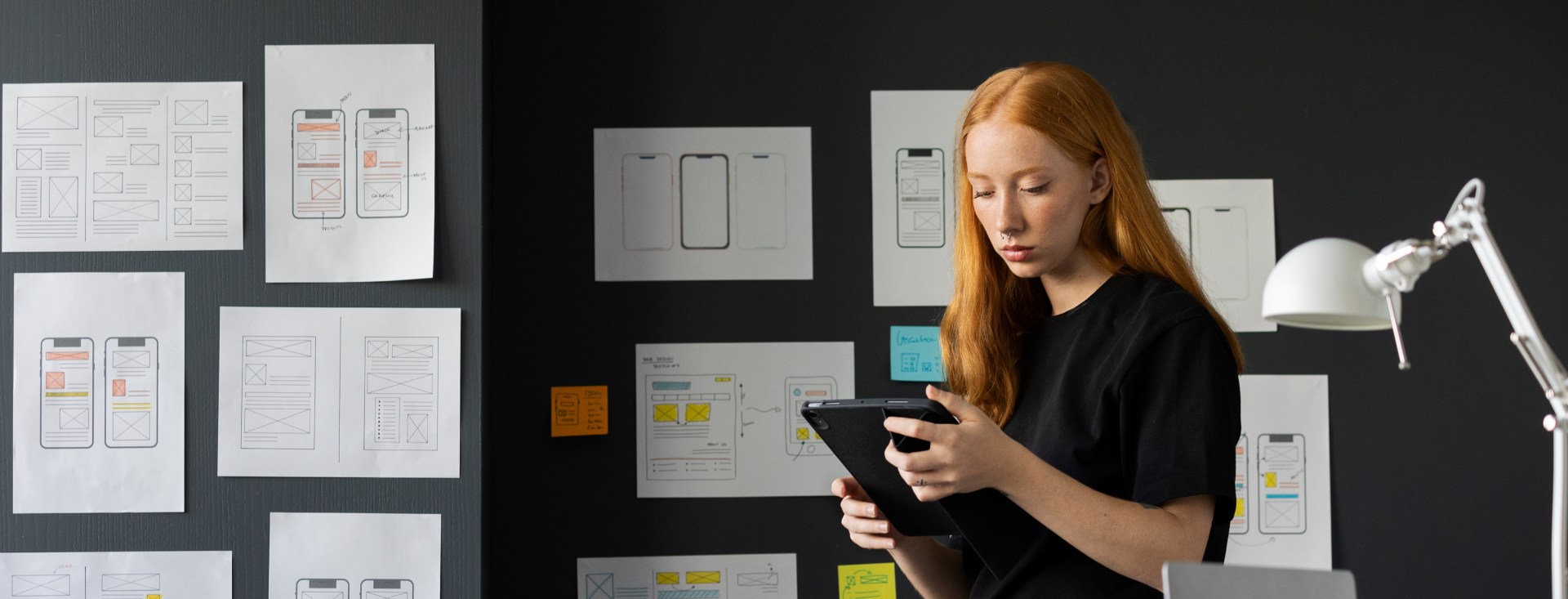How to Create a Mental Health App: An Ultimate Guide 2024
October 30, 2024
Alex Shubin | Founder & CEO at SDA

Mental health conditions are becoming the point of concern for more and more people each year. The COVID-19 pandemic has triggered the number of anxiety, stress, frustration, and depressive disorders. Over 23% of American adults experienced mental illness in 2022, 5.5% suffered from serious mental illnesses, while the relevant issues have been increasing henceforth.
This situation underpins the paramount importance of the appropriate remedy for mental health problems. The rising potential demand on the one hand and pervading digitalization on the other have spurred the advent of mental health applications. Simplifying the access to health counseling, mental wellness apps are intended to improve the mental state and overall well-being by providing diverse kinds of services online.
The sector of mental health apps is exceptionally popular and profitable, hence its attractiveness for entrepreneurs. Its value is predicted to reach $17.5bn by 2030.
Therefore, creating a mental health app is not only promising in terms of potential revenues but also socially meaningful.
We’ll discuss the benefits of mental health therapy apps, successful examples, best practices, and the steps to make a valuable app that honors user safety and health.
What Underpins the Rising Popularity of Mental Health Apps?
Along with the growing concern of mental health disorders, experts assert that 75% of individuals suffering from mental problems in developing countries are underserved in terms of adequate treatment.
Furthermore, even in the regions where mental healthcare apps count by thousands, the need for appropriate therapy isn’t completely covered. Why? Because many solutions are neither useful nor safe enough to deliver real help.
Nevertheless, experts believe that if the mental health app development process is organized adequately, these applications will bring significant use reinforcing the existing weaknesses in healthcare systems.
Therefore, the need for accessible, safe, and effective therapy is vital.
What do mental health tracking apps actually do and how can they benefit an entrepreneur?
A mental health application delivers tools that help to track, evaluate, prevent, support, and control different facets of mental health well-being, including stress, mood, sleep, or anxiety.
Although these solutions do not supersede a medical advisor, they can link patients with doctors, examine symptoms, and suggest support between doctor consultations and after receiving therapy. Apart from this, the apps are also practical in providing therapeutic activities, useful resources, and encouragement.
If you wish to join the mental health app market, you can count on several convincing benefits:
- High potential demand. The demand for mental health and wellness apps is continually growing as more people are seeking help online and a switch toward remote healthcare.
- Extensive monetization opportunities. Depending on the app’s purpose and functionality, entrepreneurs can utilize various monetization strategies, like subscriptions or freemium models, to boost profitability.
- Mastery of new technologies. Mental wellness apps go hand-in-hand with the most breakthrough techs, including AI, ML, and behavioral science. By mastering engineering advancements, entrepreneurs can raise their expertise and delight users with exclusive features.
- Collaboration opportunities. When you are dealing with healthcare apps, partnerships with healthcare professionals, researchers, and institutions are common. For entrepreneurs, such collaborations can drive credibility and promote reach.

Types of Mental Health Apps
Given their wide variety, the apps that help with mental health are usually subdivided into categories based on their purpose and methodology. For instance, some apps help to combat depression and stress; others establish healthy patterns and drive personal motivation.
Let’s investigate the core types of mental health apps to help you figure out which one to pick for your endeavor.
General mental health apps
These tools typically cover a range of issues and offer features such as mindfulness exercises, educational materials on associated topics, access to professional counseling, and community support. Their primary goal is making mental health resources more accessible and straightforward.
Examples:
- Talkspace: A renowned online therapy platform, efficiently matching patients to licensed therapists. It embraces a broad scope of therapeutic services. Professional counseling goes along with self-guided therapy meetings and free virtual wellness classes.
- BetterHelp: Grants the services of licensed therapists for online treatment and provides informational content and self-training resources.
- MyTherapy: Along with medication reminder functions, the app also delivers mood tracking, health journaling, and educational materials for mental well-being.

Anxiety, depression & mood control
Bad temper, depressive states, and anxiety are the conditions people frequently face in the modern world. Mental health tracking apps addressing these challenges are particularly demanded today.
Namely, these tools aid in mastering stress and mood swings, enhancing sleep, handling work pressure, etc.
Examples:
- Wysa: An AI-backed mental health app that delivers comprehensive support for anxiety and depressive states. It acts like a smart companion who can encourage users with in-chat conversations, monitor mood, and elevate mental and emotional welfare.
- Woebot: A chatbot that harnesses AI and cognitive behavioral therapy (CBT) techniques to assist individuals dealing with anxiety and depression.
- Happify: It works in a playful manner, offering games and other activities to create delightful experiences. By relaxing and entertaining users, Happify aids them in raising their mood and minimizing anxiety.
Solutions for addiction recovery
This group of apps for mental health therapy is aimed to treat undesired behavioral addictions. It encompasses tools for progress tracking, motivations, relapse prevention, and community encouragement. The apps urge users to implement positive habits, allow them to establish goals, and help to stay on the right path.
Examples:
- In the rooms: A social networking program for people in the recovery process. It offers various types of virtual meetings and recovery programs to support user groups.
- SMART recovery: A convenient assistant to navigate all facets of a recovery journey. Its SMART Recovery program includes tools for self-management and interactive exercises to counter addiction.
- Sober time: A sobriety tracker that controls user sobriety dates, monitors progress, provides convenient visualizations, and supports users with motivational quotes.
Specific disorder treatment apps
This is a more narrowly focused group of apps to improve mental health. The respective tools help people handle particular mental health conditions, such as OCD, PTSD, or depression.
The types of services they deliver encompass tailored resources, coping strategies, and therapeutic exercises aimed to track symptoms and grant appropriate remedies.
Examples:
- OCD Challenge: Grants tools to combat obsessive-compulsive disorder (OCD). The app allows customizing the program and utilizing exposure and response prevention (ERP) exercises to tackle individual symptoms.
- DBT Diary Card: Targets individuals with borderline personality disorder (BPD) and designed by a licensed clinical psychologist. It helps users track emotions, behaviors, and DBT skills to improve emotional regulation.
- Breathe2Relax: A stress management app that teaches deep breathing techniques, aiding in combatting anxiety disorders and stress-related conditions.
Self-development mental health apps
Self-improvement is gaining momentum among various user groups. The respective mental health monitoring apps embrace a range of personal growth aspects, from enhancing concentration to fighting fears.
The available tools include chats and video calls with professionals, exercise plans, learning materials, goal-setting techniques, and more.
Examples:
- Forest: Helps reduce phone addiction and elevate productivity. By means of gamification, the tool encourages users to avoid distractions. Thus, they keep growing a virtual forest that increases as long as a user stays focused.
- Fabulous: A daily habit-building app. It delivers tailored routines and motivational coaching to shape healthy habits in fitness, sleep, productivity, and other areas.
- Elevate: A cognitive training app that provides brain stimulating games designed to drive concentration, memory, and confidence.

Meditation & mindfulness
In a fast-paced world, people aspire for relaxation and rest that meditation and mindfulness can grant. This type of mental health mobile apps help maintain tranquility, minimize stress, and govern an individual's emotions.
The apps include educational materials, meditation and relaxation techniques, breathing exercises, music, and more.
Examples:
- Simple Habit: Includes 5-minute meditation sessions arranged for busy people. It primarily focuses on stress management, focus, and sleep, offering advice for specific moments, like before a meeting or waking up.
- Calm: A support and relaxation app containing meditation guides, breathing exercises, relaxing music, and sleep stories performed by celebrities.
- Ten Percent Happier: An app exercising a practical approach to meditation. It offers courses, conversations, and guidelines developed by mindfulness experts based on scientific knowledge and methodologies.

How to Develop a Mental Health App in 6 Steps
When building a mental health app, follow these steps to make the process smooth and organized.
1. Generate the app idea
Creative, innovative, and relevant product concept is the key to your app’s triumph. Start by shaping a general idea with its subsequent validation and maturation.
- Identify your focus. Determine the type of mental health issues your app will address (e.g., anxiety, depression, addiction, self-development, or meditation).
- Determine the remedy. Think of the basic approaches you’ll apply to relieve the problem.
2. Conduct comprehensive market research
The goal of this stage is familiarizing yourself with the market, exploring your target consumer, and confirming the pertinence of your idea.
- Analyze competitors. Review existing mental health apps and assess their upsides and downsides. Try to find underserved areas.
- Study the target audience. Who will use the app? Characterize your target user by the core parameters, including age, location, mental health issue, etc. Explore your community to identify their pain points.
- Investigate the market trends. Study the existing mental health apps market tendencies, such as elevating demand for online therapy and growing mindfulness practices to make your app fits into the environment.
- Understand regulatory requirements. Mental health apps often require compliance with privacy laws, like HIPAA in the U.S. Your app must correspond to them.
3. Think about mental health app features
Here, you should determine the fundamental functionality of your app, leaving the auxiliary features aside.
- Core features. Depending on the selected app type, establish essential functionality, such as guided meditations, mood tracking, or live therapy sessions.
- User experience. Develop user-friendly navigation and personalization. Make the user path convenient by including reminders or progress tracking.
- Security and privacy. Take care of appropriate security measures, like encryption, secure login, and data protection.
- Content integration. Audio, video, and textual materials must be easy to integrate.
4. Choose a monetization model
Your monetization strategy can include one or a combination of various approaches, including those listed below.
- Freemium model. Basic functionality is available for free, while premium features can be accessed through subscription.
- Subscription-based model. Consumers pay a monthly or yearly fee to exploit the app.
- In-app purchases. Let users buy specific content (i.e., guided meditation packs or therapy sessions).
- Ad support. Your app goes for free but includes ads. However, remember not to overload a user.
5. Select a software development partner
Choosing the appropriate partner is crucial to make a winning solution. Experienced developers know the intricacies, pitfalls, and effective approaches to building a mental health app from scratch.
Focus on the following things in your selection process:
- Prioritize experience. Teams with a track record in building health or wellness apps are familiar with necessary compliance and user experience requirements.
- Check portfolio and reviews. Examine case studies, consumer testimonials, and the partner’s expertise.
- Consider communication and management aspects. Teams that have well-established communication procedures and overall working process are more likely to help you reach your goals.
6. Develop and launch an MVP
An MVP is a great way to start joining the mental health and wellness industry, as it reduces required resources and minimizes time-to-market.
- Focus on essential features. Build and test the basic functionality with a smaller audience.
- Collect feedback. Your first users will become your primary source of valuable information on the app's convenience, features, and overall operation.
- Revise and improve. Continual improvements are an indispensable part of the successful app’s lifecycle. Make adjustments in response to user comments, fix bugs, enhance features, and fine-tune overall design.
- Envisage the official launch. As soon as you validate the MVP, activate your marketing and present the full version to a broader group.
Best Practices for Mental Health App Development
To start a mental health app that will outperform competitors, you should explore the niche by knowing market tendencies.
We’ve picked several best practices in mental healthcare app development, which we recommend for implementation.
Consumer-centric design
In the mental health app development process, you should prioritize simplicity, accessibility, and convenience. Remember that people using these services are often dealing with stress or depression, so the interface must be intuitive and calming.
The content should be presented in a friendly manner, without jargon or excessive technical terms. Make the instructions and guidance easy to follow. Ensure the overall app’s arrangement maintains a supportive tone, from notifications to design elements. A mental health app should create a positive overall feel, promoting trust and engagement.
Wide accessibility should embrace all users, including those with disabilities. Thus, consider options like voice commands, text-to-speech, or high-contrast mode.
Personalization
Personalization reigns modern businesses, and the healthcare sector is no exception. What does it imply in mental health application development? People value tools addressing their specific needs. This would be easier to attain if you have studied your target community appropriately.
Furthermore, you can utilize in-app functionality to deliver tailored services. Thus, developers often establish an onboarding process, where the app asks questions about the user state, goals, communication preferences, etc.
Eventually, the solution will be able to provide the right therapy, recommendations, and support.
Gamification
The users of mental healthcare apps often deal with emotional issues. Gamification helps to remedy these states and amplify motivation. Therefore, such game elements as rewards and challenges are common in apps for mental health.
A certain portion of entertainment is appropriate, as it engages the users, gives them a relaxing break from daily routines, and encourages them to attain their goals quickly. Just make sure to keep the right balance between a game and medical advice, in order not to blur the main focus.
Security and regulatory compliance
Mental health apps often collect sensitive personal information, including mental health status, therapy session results, or personal journal entries. User data security must be guaranteed. Besides, consumers should be able to control what data they share and how it’s used.
The protective measures for consumer information are usually regulated with special norms and rules, such as HIPAA. They include the requirements for data storage, sharing, and transmission.
Therefore, your product should guarantee strict compliance with regulatory guidelines.
Integration with existing systems
Since mental health apps can be only part of a comprehensive therapy, they must be compatible with other healthcare tools. The systems they should be integrated with include electronic health records, wearables, therapist and provider platforms, third-party mental health services, and insurance systems. These integrations add to the app's universality and convenience.

Mental Health App Development: Wrapping Up
With the rising global concern for mental health issues, the demand for the respective remedies is continually growing. The fusion of technology and mental healthcare hugely impacts the way modern patients receive medical services and expands the service types.
The revolutionizing effect of mental health applications on the industry makes them a lucrative opportunity for entrepreneurs.
For those seeking to grant users an innovative relief by developing a mental health app we’ve covered the core mental health apps types, the benefits of crafting such a solution, the fundamental steps of the development process, and the best practices worth implementing.
However, the intricate software building process requires an experienced and trustworthy partner who will drive your idea to perfection. SDA focuses on mental health app development services and knows how to carve innovations in this sector. Our team will harness the newest technology to help you seamlessly attain your goals.
Contact us to breathe life into your idea by accompanying you in your entire app development journey.
FAQ
What is a mental health app?
A mental health app aims to help people with emotional or behavioral concerns. These software solutions contain diverse tools that help to fight such issues as stress, low mood, sleep problems, or anxiety. The different types of mental healthcare applications include general mental health, depression & mood control, addiction recovery, or self-development.
How do you create a mental health app?
The development process will be easier to manage if split into several steps. Start by generating the relevant app concept. Then, study the market and your user community. This would help you better understand the niche and demand. Determine the necessary features and choose the app’s monetization model. Finally, craft a minimum viable product to test your solution with real users.
How long does it take to develop a mental health app?
The exact time frame of a mental health app development depends on the task complexity, features, and the development team's expertise. A typical project may last from 4 to 6 months. For more complex solutions with advanced functionality, the project duration can be longer.
Are mental health apps profitable?
An app for mental health support can be profitable thanks to elevating demand for accessible mental wellness tools. Profitability also depends on the monetization model that entrepreneurs select. Thus, they can choose among subscriptions, in-app purchases, freemium services, and other options or their combinations.
What is the trend in mental health apps?
The most widespread approaches in mental health apps arrangement embrace consumer-centric design, personalized tools, and gamification. Such features as teletherapy, mood tracking, and integrations with other services (i.e., wearable devices) are also under high demand.
In general, the creators of modern health solutions strive to deliver accessible, affordable, and pleasing remedies to people experiencing mental concerns.



